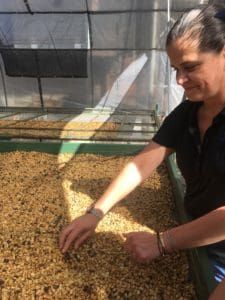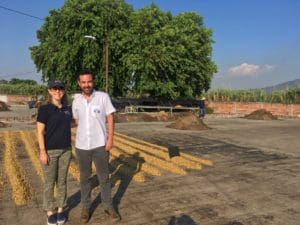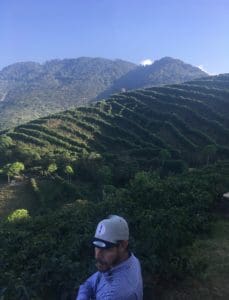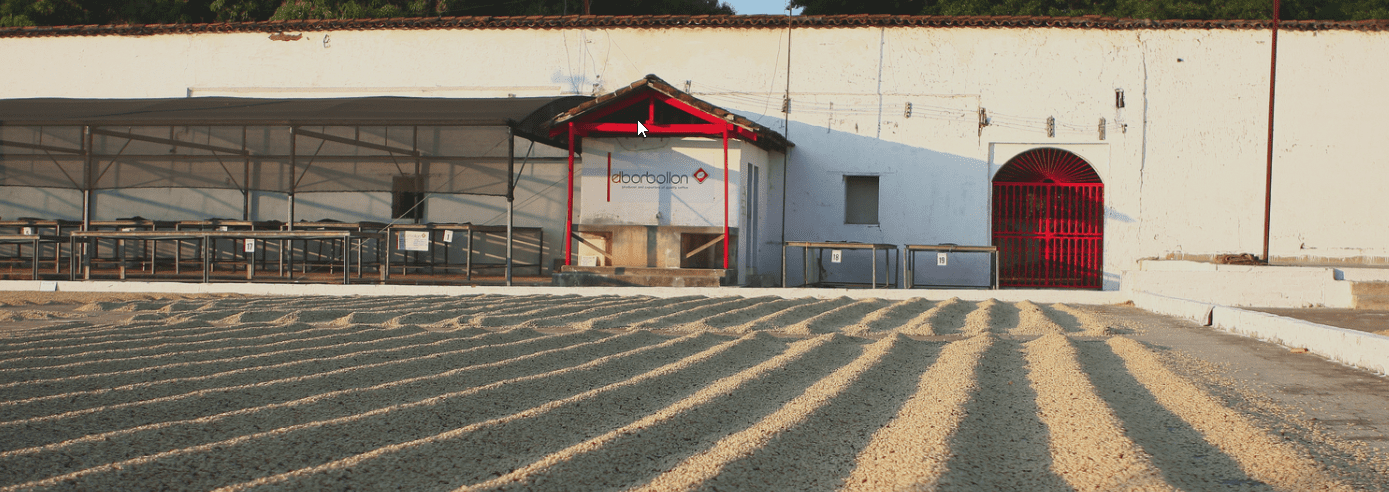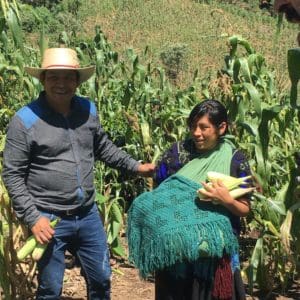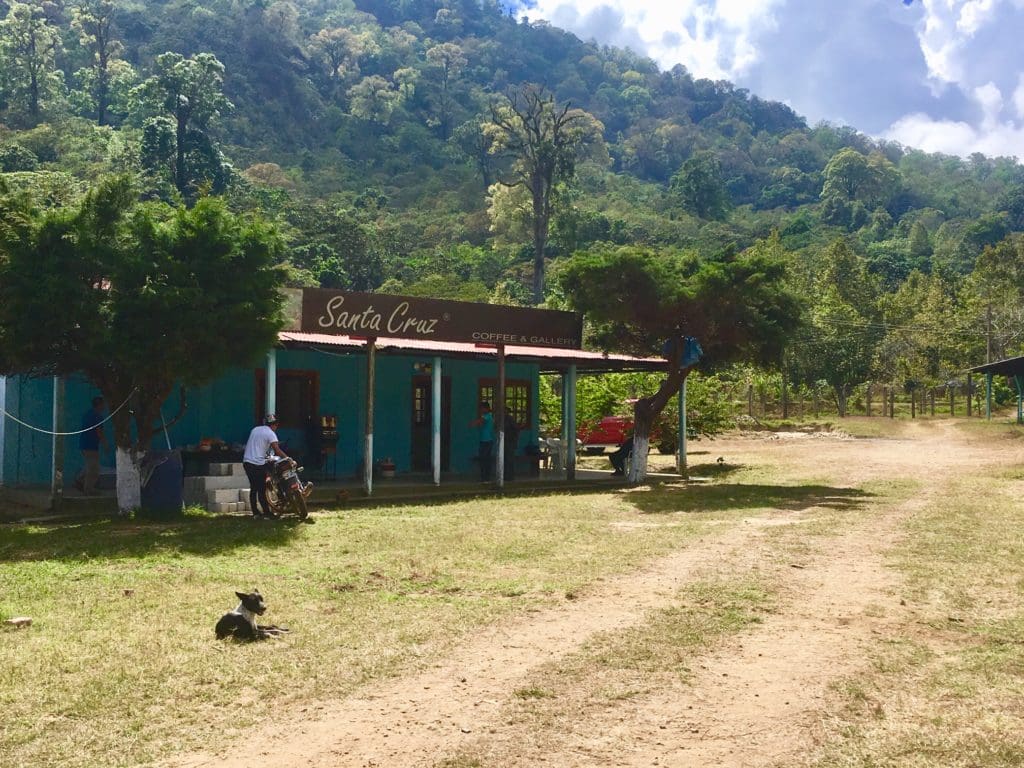We kicked off this trip visiting Beneficio Las Tres Puertas and J. Hill Coffee. J. Hill was founded more than 120 years ago in Santa Ana, western El Salvador. They specialize in wet and dry processing of coffee, as well as supporting farmers to help them improve production, quality, and sustainability. We began working with J. Hill recently due to our relationship with Aida Batlle. Aida has been processing her coffee there since 2003, both from her own farms and also through the farms that she consults for under the Aida Batlle Selection. This year, Aida and J. Hill have been experimenting with different types of shade drying on the expansive patios with the goal of slowing the drying process. They believe this will minimize the coffee’s exposure to UV light, as well as help preserve the embryo of the coffee. They have set up several different drying systems using raised beds, dark screens, screens with plastic, and different levels of air flow. They plan to cup these coffees side by side to see which shade dried process produces the best results in terms of cup quality, water activity, moisture and coffee longevity. So far, using various shade-drying methods, they have been able to reduce the temperature of the patios by nearly 30 degrees Fahrenheit, which they believe will help to extend the shelf life of the coffee.
Our next stop on the tour was Café Pacas, visiting with the brother and sister team Maria and Alfredo Pacas. Café Pacas is very much about community integration and they know that it takes a grand effort from everyone in their value chain to make their coffee exports possible. At a glance, they work with 44 agronomy suppliers, 850 farm workers on 19 different farms, 54 mill workers, 12 administration employees and have 61 clients worldwide. The greatest challenge for Café Pacas this year has been keeping up with innovation. As coffee continues to evolve, the Pacas’ are constantly innovating to produce better quality coffees and increase productivity. Currently, they are focused on variety development, agricultural practices (such as improved soil health and greater plant density) and processing methods such as anaerobic fermentation. We'd also like to congratulate Café Pacas for winning third place this year in the Cup of Excellence with their Bernadina variety.
Just around the corner from several of the Café Pacas' Farms, we spent the day with Emilio Lopez Diaz at his operation, Cuatro M Cafes. Emilio and his family are the owners of Finca and Beneficio El Manzano. For the past 6 years, Emilio has been working tirelessly to replant Finca El Manzano in its near entirety. Today, they have 12 varieties currently in production; Pacamara, Red, Yellow and Orange Bourbon, Pacas, Caturra, Gesha, SL 28, SL 24, Catuai, Ethiopia Heirloom and Acaia. Taking a different point of view from nearly ever producer in the country, Emilio believes in full sun grown coffee with multiple fertilizations (5-6 per year), and this year it was evident that his plants are also a fan of his method. We tasted some of the best coffees we’ve ever seen from Finca El Manzano, and Emilio also reported that he has the highest yields to date. Incredibly, some varieties are able to produce up to 100 quintales per manzana. After taking a twelve-year hiatus from competing in the Cup of Excellence, Emilio won both first and second place in 2018.
Our final stop in El Salvador was spent with the Mendez Ortiz family, visiting their farms Talnamica and El Guaje, both located in western El Salvador. We have several clients who have a nearly decade long relationship with the Mendez Ortiz and we have seen their coffee quality increase by several points over the last few years. A week after our visit, the Mendez submitted their coffee to a local competition called Juayua Coffee Expedition. It was the first year of production for their SL 28 planted at 1600 masl, and they secured first place out of over 30 coffees.
The Mendez process their coffee at El Borbollon in Santa Ana. El Borbollon has made major investments in their mill with the wet and dry processing of their coffees. This year they installed nine sensors throughout the mill that record ambient information every 15 minutes. The goal is to better understand how humidity and temperature affect coffee and to better control both during fermentation, patio and raised bed drying, as well as in the nursery and warehouses. They also installed a new roof on their hulling and sorting area to better store the coffee against the elements and also protect the 40 women who go to work their every day sorting coffee.
Next, we headed west to Mexico to visit our NKG partner Exportadora Café California (ECC). ECC currently has 16 purchase operations, 3 dry mills and 4 proprietary farms that are located primarily in Chiapas, with a few stations also in Veracruz, Puebla, and Oaxaca. Mexico is the 7th largest coffee producer (and the largest producer of organic coffee) in the world. ECC continues to expand their Por Mas Café program with the primary goal of ensuring supply for the future and supporting small producers in the main coffee producing areas by providing technical support, financing, certifications, and renewal programs. The Por Mas Café program is oriented towards small producers who want to improve their livelihoods by working their land, who believe in a sustainable agricultural business model (even one that goes against traditional systems), and who understand that being involved in this program takes a tremendous amount of work and time. Since the inception of this program in 2014, Por Mas Café has planted 31 million plants, spent 615 million pesos on renovations, renewed 4,932 hectares of of land, assisted 6700 producers, and provided 235 million pesos towards financing for producers.
The main objective of this year’s trip was to visit some of the more remote areas of Chiapas and meet farmers who are producing exceptional Mexican coffees. Over the last few years with the unpredictability of the C market, Mexico’s had a difficult time competing with their larger producing neighbors such as Honduras, who can sell a similar quality coffee at a much lower differential due to their volume. To combat this, ECC has been trying to promote higher end coffees and micro-lots in the hopes of receiving better pricing. We visited Finca and Beneficio Santa Cruz whose owners sell their coffee to ECC. They are a privately owned estate of 300 hectares producing Gesha, Yellow Caturra, Bourbon, CR95, Typica and Catimor. We tasted some truly beautiful coffees, one of which was the best Mexican coffees we've ever tasted.
Exportadora Café California had expected to export 1.5 million bags for the 18/19 harvest, but suspect they will only get to around 600,000 bags. The crop was much lower than initially forecast and coffee did not develop well throughout the harvest. Additionally, because of the extremely depressed C market, many small producers abandoned their farms altogether. If the C price continues its downward trend, Mexico expects to export even less in 19/20.
